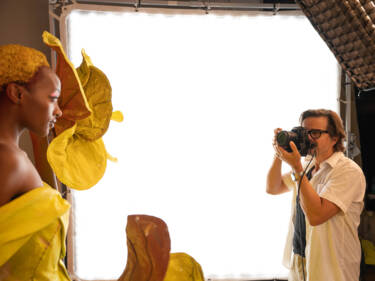What is Rich Tone Portrait like? Wedding photographer Frøydis Geithus tests the new Nikon Z 8 firmware v.2.0 update

New settings for portraits and monochrome shooting are a ‘gamechanger’, with incredible image quality and significantly reduced workflow
Nikon Ambassador Frøydis Geithus is one of the world’s leading wedding photographers, known for her signature style that incorporates wild landscapes and dramatic light into her beautiful, romantic portraits.
As someone who was among the first to use the Nikon Z 8, it was only natural that we should ask her to test out the new firmware v.2.0 update to this incredible camera, particularly the new features for portraits, such as Rich Tone Portrait and the monochrome modes.

Frøydis Geithus

Nikon Magazine: Hi Frøydis, so what was your first impression of the new firmware?
Frøydis Geithus: It was fantastic! Seriously, some of the features are a real gamechanger for me and my work. As a wedding photographer, skin tone is everything. Often getting skin tone right in landscapes outdoors can be difficult because the camera is taking in so much information. There are all these colour tones from the surroundings, and you also have a couple in the image, and balancing all those tones is always super difficult. But with the new Rich Tone Portrait setting it’s flawless, straight out of the camera in the RAW files. And it’s natural, too. I work with real people, and I want it to be real. So there is a softness there in the skin tone, but people still have texture.


Having those results out of the camera must then affect editing time?
Absolutely. We’re all shutter-happy these days – especially wedding photographers. I can easily take around 9,000 photos from a weekend. For a one-day wedding, it can be around 4,000. So now I don’t have to worry about skin tone in the edit, which is a really big deal for me. Clients understandably want to see images of their wedding quickly after the event. I have a turnover of about eight to ten weeks and the new firmware is going to cut down my time significantly.
What about the new monochrome settings?
I thought the Deep Tone monochrome was flawless. I basically don’t have to edit those images. It’s ‘plug and play’ and send it to your clients! Black and white is not black and white, it’s all these different tones in between, and the update is amazing for that. Black and white can often become dull, and the contrast and deep blacks available now are really stunning. I don’t often have black and white in the viewfinder when I’m shooting, but I know a lot of professionals who do, because with colour there’s often just too much information – you can get so much from an image just by looking at it in black and white. In fact, I know photographers who use this technique even if they are going to produce colour images, but they look through the camera in black and white when taking them to understand the contrast and the light.


Were there other things in the update that you tried?
I actually tried the bird tracking and it was amazing, and I thought, “I could use this for bouquet shots!” Getting great images of a bride throwing the wedding bouquet can be a challenge, so I’m looking forward to experimenting with that to see how it works.


Frøydis Geithus’ top tips for wedding photography
1. Make use of auto ISO
I mostly work in full manual, but there are times when the camera is better than me in a lot of ways! Auto ISO really helps during the time when you’re taking candid, reportage-style images and are moving around through different light levels, such as coming out of church or during the evening party. I select parameters of 100 ISO minimum and 3200 ISO maximum and it’s spot on every time.
Read more: How to shoot wedding reportage
2. Shoot RAW
Features and presets have to work with RAW files – that’s a deal-breaker for me. You need all that information on the image, to be able to see the texture in things and faces and have creative freedom in the edit. You don’t get that with JPEGs. That’s why the Rich Tone Portrait setting works so well for me – because the images are amazing straight out of the camera in RAW.
3. Make use of contrast
Especially if you are creating black and white images, contrast brings vibrancy and intensity. This is really important if, for example, you are taking pictures of a bride in a white wedding dress and a groom in a dark suit. Use that contrast to create drama. And outdoors, don’t forget the sky. Previously I would have to bring the sky back in during the edit, but with the new monochrome settings I don’t have to.
4. Print them out
I always want my clients to have prints of the images, because that’s where you really see the details and the colours. We have so many photos stored now and yet we seldom look at them. Prints are a totally different experience.
5. Make it, don’t take it
People think they can take wedding pictures and portraits with their phones but, honestly, they can never be as good as with a camera. In a phone, it’s all processed, filters are on, everything is done inside the phone for you. With a camera, you’re changing a lens, changing the settings to suit the environment and your creativity, editing afterwards… you’re making a photo, not just taking one.
More in weddings
Keep up to date with firmware updates
Firmware update v.4.0 for Nikon Z 9 opens up great new features

Unleash your creativity










